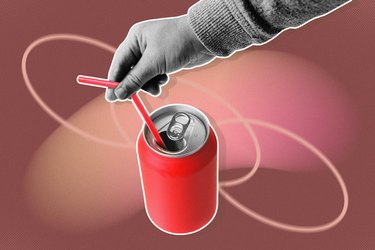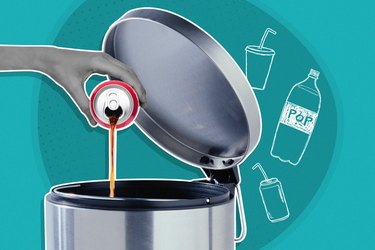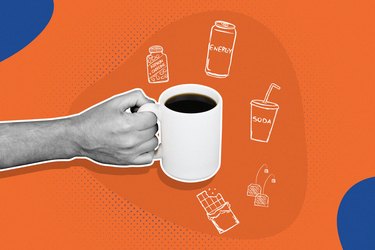
The combination of a sweet taste, carbonation and caffeine makes soda a favorite drink for many. But on the other hand, soda can be a source of empty calories, sugar or artificial sweeteners.
Either way, making soda a daily habit — whether you're drinking regular or diet — could spell bad news for your health.
Video of the Day
Video of the Day
Your Risk of Heart Disease and Stroke Increase
Heart disease is the leading cause of death in the U.S., per the Centers for Disease Control and Prevention (CDC). Unfortunately, drinking soda every day can further increase this risk.
A May 2014 meta-analysis in Atherosclerosis found that one daily serving of soda or other sugar-sweetened drinks was associated with a 16 percent increase in heart disease.
A study published in the May 18, 2020, Journal of the American Heart Association found that "Consuming one or more servings per day of sugar-sweetened beverages was associated with cardiovascular disease, revascularization and stroke."
Both regular and diet soda were associated with an increased risk of stroke, according to a May 2012 study in The American Journal of Clinical Nutrition. On a related note, researchers studying a data set spanning from 2004 to 2018 published their findings in the Nutrition Journal in June 2022. "Our findings support the hypothesis that soft drink intake increases blood pressure," they concluded.
You May Be Harming Your Gut
While clear sodas may be a common source of comfort for a sour stomach, soda's daily effect on gut health may actually cause more harm than good.
"Soda — both regular and diet — negatively affects the gut," says Anya Rosen, RD, CPT a virtual functional medicine practitioner based in New York City. "Added sugars promote the overgrowth of harmful bacteria and fungi, such as candida. Meanwhile, some artificial sweeteners such as sucralose have been shown to alter the gut microbiome."
Plus, drinking carbonated beverages may also cause gas and bloating, and worsen symptoms of other digestive issues like acid reflux, Rosen says.
You'll Have an Increased Risk of Diabetes
Soda, like other sugary beverages, can cause a spike in blood sugar after drinking it. When blood sugar spikes, insulin is released into the bloodstream to bring that sugar into cells for energy or storage.
Drinking soda every day means this spike in blood sugar and insulin is happening frequently throughout the day, which may increase the risk for diabetes.
While diet soda does not directly cause a spike in blood sugar, there is still caution warranted with drinking diet soda and diabetes risk. In fact, a May 2018 study in Current Developments in Nutrition concluded drinking either regular or diet soda was associated with an increased risk of diabetes.
In an April 2013 study in the European Journal of Nutrition, researchers found that drinking diet soda often was significantly associated with an increased risk for diabetes in Japanese men over a 7-year period.
Your Liver Health May Take a Hit
The liver is directly involved with metabolizing the sugar from soda.
The main sweetener in soda, high-fructose corn syrup, increases fat production in the liver. That means drinking soda every day can increase the amount of fat produced in the liver, which can ultimately lead to a condition called non-alcoholic fatty liver disease (NAFLD).
NAFLD can increase inflammation in the liver and is considered the most common liver disorder in Western societies. According to a July 2016 meta-analysis in QJM: An International Journal of Medicine, there is a significant association between drinking regular soda and NAFLD.
In fact, a six-year observational study published in the November 2022 Clinical Gastroenterology and Hepatology found that "frequent sugar-sweetened beverage consumers had 2.53 times increased odds of incident NAFLD compared with non-consumers."
You May Gain Weight
Soda is a source of extra calories and sugar in the diet. When you drink soda every day, these extra calories could promote weight gain. According to the USDA, a 16-ounce can of cola provides:
- 207 calories, 10% Daily Value (DV)
- 1.2 grams of fat, 2% DV
- 51 grams of carbs, 17% DV
- 49 grams of sugar, 98% DV
Losing or maintaining weight can be easier when you don't drink soda every day.
A November 2017 study in the American Journal of Public Health tracked more than 115,000 Mexican women over a 2-year period and observed that drinking less soda was associated with less weight gain.
Diet Soda and Weight Gain
While diet soda does not provide any calories or sugar, interestingly, drinking it every day may also be associated with weight gain.
For example, people ages 65 years and older who drank more diet soda were observed to have more stomach fat in a March 2015 study in the Journal of the American Geriatrics Society.
The relationship between diet soda and weight gain is complex. Initially, replacing soda with diet soda means cutting out extra calories and sugar in the diet. But here's the thing: If you drink diet soda daily, the intensely sweet flavor can heighten the urge to keep eating sweets throughout the day.
Your Bones and Teeth Can Weaken
Drinking soda daily, especially in place of water, could harm tooth enamel. The combination of acid and sugar from drinking soda can cause tooth enamel to weaken, which could increase the risk for cavities. Besides teeth, soda can also harm bone health.
"Sodas, especially colas, can increase one's risk for osteoporosis," says Michelle Rauch, RDN. "Many of these soft drinks contain phosphorus (often listed as 'phosphoric acid' or 'phosphate'), which increases the calcium excretion in your urine. And, the caffeine in soda can interfere with calcium absorption and lead to bone loss when taken frequently. So, it is important to ensure your diet includes enough calcium and vitamin D to mitigate the risk."
Drinking soda every day means that you're probably not drinking as much water or high-calcium milk. "If one's calcium intake is low, and there is a high intake of phosphorus-laden beverages, it puts someone at high risk for low bone density and an increased risk of fractures and osteoporosis," Rauch says.
You'll Have a Higher Risk of All-Cause Mortality
Perhaps most surprising of what can happen when you drink soda every day is an increased risk of all-cause mortality.
In a large September 2019 study in JAMA Internal Medicine, researchers looked at data from over 451,000 people across 10 European countries and found intake of total, sugar-sweetened and artificially sweetened soft drinks was positively associated with all-cause deaths.
The Bottom Line
Drinking soda every day, whether regular or diet, is associated with increased risk for heart disease, diabetes, weight gain and all-cause mortality. It can also negatively affect your bones, teeth and liver.
If you enjoy drinking soda, do so occasionally — think: once a week — instead of every day and your body will thank you.
- Atherosclerosis: "Sugar Sweetened Beverages Consumption and Risk of Coronary Heart Disease: A Meta-Analysis of Prospective Studies.
- The American Journal of Clinical Nutrition: "Soda Consumption and the Risk of Stroke in Men and Women"
- Centers for Disease Control and Prevention: "Heart Disease Facts"
- Current Developments in Nutrition: "Diet Soda and Sugar-Sweetened Soda Consumption in Relation to Incident Diabetes in the Northern Manhattan Study"
- European Journal of Nutrition: "Sugar-Sweetened Beverage and Diet Soda Consumption and the 7-Year Risk for Type 2 Diabetes Mellitus in Middle-Aged Japanese Men"
- QJM: An International Journal of Medicine: "Associations of Sugar and Artificially Sweetened Soda with Nonalcoholic Fatty Liver Disease: A Systematic Review and Meta-Analysis"
- MyFoodData: Cola Soft Drink
- American Journal of Public Health: "Changes in Sugar-Sweetened Soda Consumption, Weight, and Waist Circumference: 2-Year Cohort of Mexican Women"
- Journal of American Geriatrics Society: "Diet Soda Intake Is Associated with Long-Term Increases in Waist Circumference in a Biethnic Cohort of Older Adults: The San Antonio Longitudinal Study of Aging"
- JAMA Internal Medicine: "Association Between Soft Drink Consumption and Mortality in 10 European Countries"
- Journal of the American Heart Association: "Sugar‐Sweetened Beverage Intake and Cardiovascular Disease Risk in the California Teachers Study"
- Clinical Gastroenterology and Hepatology: "Sugar-Sweetened Beverage, Diet Soda, and Nonalcoholic Fatty Liver Disease Over 6 Years: The Framingham Heart Study"
- Nutrition Journal: "Soft Drink and Non-Caloric Soft Drink Intake and Their Association with Blood Pressure: the Health Workers Cohort Study"



